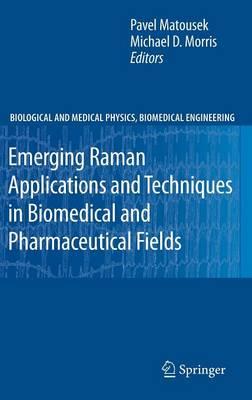Overview
In recent years, Raman spectroscopy has undergone a major transformation from a specialist laboratory technique to a practical analytical tool. This change was driven on several parallel fronts by dramatic advances in laser instrumentation, detectors, spectrometers, and optical ?lter technology. This resulted in the advent of a new generation of compact and robust Raman instruments with improved sensitivity and ?exibility. These devices could be operated for the ?rst time by non-specialists outside the laboratory envir- ment. Indeed, Raman spectroscopy is now found in the chemical and phar- ceutical industries for process control and has very recently been introduced into hospitals. Handheld instruments are used in forensic and other security applications and battery-operated versions for ?eld use are found in envir- mental and geological studies. Simultaneously, major advances have been seen in the development of powerful processing methods, some driven by the progress of related spect- scopic methods such as NIR absorption spectroscopy. Numerous chemometric packages are available for advanced analysis of data. These do not require specialist user knowledge (although caution is required in interpreting - sults) and provide further enhanced sensitivity and capability to the Raman technique. In this book we focus on two such major ?elds, biomedical and ph- maceutical. The book is aimed at life sciences and pharmaceutical re- erships. Accordingly, the chapter authors emphasize explanatory material with practical implications rather than focusing on mathematical detail.
Full Product Details
Author: Pavel Matousek ,
Michael Morris
Publisher: Springer-Verlag Berlin and Heidelberg GmbH & Co. KG
Imprint: Springer-Verlag Berlin and Heidelberg GmbH & Co. K
Edition: 2010 ed.
Dimensions:
Width: 15.50cm
, Height: 3.30cm
, Length: 23.50cm
Weight: 0.989kg
ISBN: 9783642026485
ISBN 10: 3642026486
Pages: 478
Publication Date: 12 February 2010
Audience:
College/higher education
,
Professional and scholarly
,
Postgraduate, Research & Scholarly
,
Professional & Vocational
Format: Hardback
Publisher's Status: Active
Availability: In Print

This item will be ordered in for you from one of our suppliers. Upon receipt, we will promptly dispatch it out to you. For in store availability, please contact us.
Author Information
Michael D. Morris is professor of chemistry at the University of Michigan and an affiliated member of the university's Biomedical Engineering faculty, its Comprehensive Cancer Center and its Core Center for Musculoskeletal Research. He presently serves on the editorial boards of Applied Spectroscopy, Journal of Biomedical Optics and Calcified Tissue International. His honors include the ACS Division of Analytical Chemistry Award in Spectrochemical Analysis, the Anachem Award, the Society for Applied Spectroscopy New York Section Gold Medal and Meggers Award, the Mann Award in Applied Raman Spectroscopy, and several University of Michigan awards. His research interests include Raman spectroscopy and Raman imaging. He is a pioneer in the analytical applications of Raman spectroscopy, particularly in its uses in microscopy and imaging. He has made important contributions to Raman spectroscopic instrumentation based on holographic and liquid crystal optics and has been a leader in development of computational techniques for multivariate Raman image processing and three-dimensional Raman imaging. In the last several years his laboratory has led the development of Raman spectroscopy for study of musculoskeletal tissues. He and his co-workers have published on bone biomechanics, structure/function relationships in mouse models for genetic disorders, mechanisms of tissue mineralization and non-invasive spectroscopic assessment of bone quality. Pavel Matousek obtained his MSc and PhD degrees in physics from the Czech Technical University, Prague, the Czech Republic, the latter in partnership with the Rutherford Appleton Laboratory (RAL) in the UK. From 1991, he has worked at the Central Laser Facility, RAL where he is presently a Programme Manager at the Lasers for Science Facility. His research includes the use of time-resolved Raman spectroscopy in the investigation of short lived intermediates, the rejection of fluorescence from Raman spectra and the application of nonlinear optics in spectroscopy and high power laser research. His current research focuses on the development of deep non-invasive Raman methods for biomedical, pharmaceutical and security applications. He is a co-recipient of two Meggers Awards from the Society of Applied Spectroscopy. In 2007, he was appointed as a Fellow of the Science and Technology Facilities Council and as a Visiting Professor of the University College London. He is also serving as an International Delegate on the Governing Board of the Applied Spectroscopy (2007-2009).




